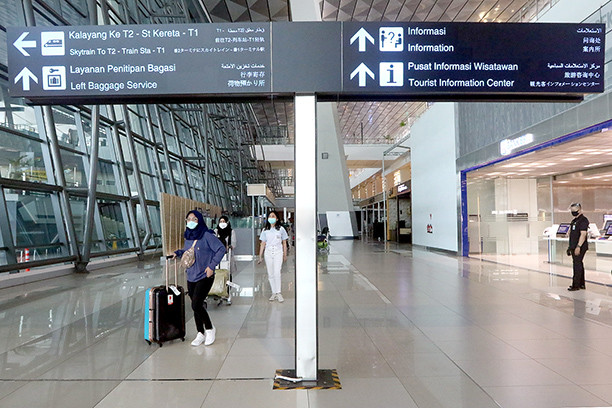Popular Reads
Top Results
Can't find what you're looking for?
View all search resultsPopular Reads
Top Results
Can't find what you're looking for?
View all search resultsThe need for foreign companies to manage our airports
The last 20 years have shown how poor Indonesia’s capacity has been in managing its airports.
Change text size
Gift Premium Articles
to Anyone
T
ransportation Minister Budi Karya Sumadi recently told a hearing with the House of Representatives (DPR) Commission V overseeing transportation that the management of Komodo Airport in the prominent tourist destination Labuan Bajo, East Nusa Tenggara, would be contracted to a consortium led by Singaporean companies.
As if to convince the lawmakers, Budi, however, insisted that the Singapore consortium would not control the airport.
The issue of foreign companies granted the right to manage airports in the country has sparked public controversy. Experience has shown we are often weak in establishing binding agreements or contracts with foreign parties. This weakness further hinders us from executing contracts or creating agreements with foreign parties.
In the case of airport investment, the key is to secure our national interests in the contractual agreement. Once it’s all secured, everything will be fine. If we look further at the presence of foreign investors in airport management, for certain this policy will be very beneficial as Indonesia still needs to learn all aspects of professional airport management.
The last 20 years have shown how poor Indonesia’s capacity has been in managing its airports. The exponential passenger growth in the last couple of years was not adequately responded to by airport management and aviation infrastructure development. For example, when the Soekarno Hatta International Airport started to operate beyond capacity, there was no initiative to conduct a deep analysis and establish development plans. Airport administrators instead chose an easy way out by moving part of Soekarno Hatta’s excess traffic to the Halim Perdanakusuma Airport, which also serves as an Air Force base in East Jakarta
The decision, of course, created new problems. Military aviation activities at Halim were disrupted and commercial civil aviation had to operate in an area that should be restricted because it hosts the national air defense system. Unsurprisingly, two civilian airplanes collided on the grounds of the Halim Perdanakusuma Air Base.
The administrators seemed completely ignorant of the designation of airports for the benefit of commercial civil aviation and the functioning of an Air Force base. Such a situation has been visible in several other airports such as in Bandung in West Java, Surabaya in East Java and Yogyakarta.
One of the worst mistakes in the government’s air transportation policy is the construction of the Rp 2.1 trillion (US$144.8 million) Kertajati International Airport in West Java. The airport is grossly underutilized despite its huge investment value.
It was simply an utterly poor decision to move civil aviation activities to Kertajati from Bandung’s Husein Satranegara Air Force Base. Eventually, many flights have returned to Husein Sastranegara for aviation safety. Civilian aviation activities have interfered with both military activities and the operations of state-owned aircraftmaker PT Dirgantara Indonesia.
There has also been endless confusion as to which airport should serve as an international airport or domestic airport because this classification defines the kind of management needed.
If we allow experienced foreign airport management companies to manage well-chosen airports in Indonesia, we can learn a lot from them. The key is to make clear-cut requirements in the management contract as regards to the transfer of skills and expertise to Indonesia during a specified period of the contract.
We have to admit that the quality of our workforce in the aviation sector in general — and specifically in airport management — is still way behind those in advanced countries.
It is sad to say that amid the fantastic growth of airplane passengers lately, the human capital of the aviation sector remains below requirements in terms of quality and quantity. The national aviation potential is not supported by enough educational institutions for aviation professionals. There is only one university that provides education equivalent to a master's degree program in aviation management in Indonesia.
It must be admitted that we have not paid attention to education and training to produce skilled personnel in the aviation sector. This is a challenge that must be immediately addressed. Collaborating with foreign parties is one step that should be considered given our shortage of experts in aviation and airport management.
Hopefully, our cooperation with foreign parties will enhance the standard of human resources in aviation. In this regard, cooperation should focus on the field of training and education in aviation management.
***
The writer is chairman of the Indonesia Center for Air Power Studies and former Indonesian Air Force chief.










